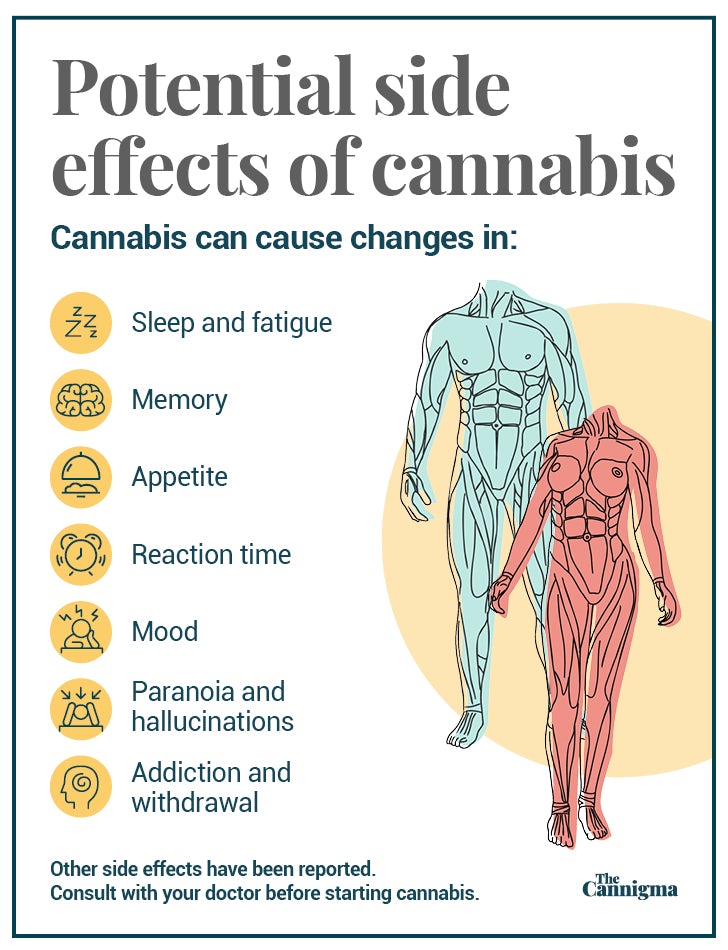Temporomandibular Joint (TMJ) disorder is an often severe pain disorder that the endocannabinoid system may regulate. Pain and inflammation — two key symptoms of TMJ disorder — are closely related to the endocannabinoid system and cannabis. Since cannabis influences the endocannabinoid system, it may be medically viable for treating pain caused by TMJ disorder.
There is some research showing cannabis helps reduce pain and inflammation in the temporomandibular joint, as well as pain in other conditions including migraines, osteoarthritis, rheumatoid arthritis, tension headaches, and chronic pain in general.
Cannabis is safe and well-tolerated for treating chronic pain and is therefore safe to use for TMJ and potentially effective for treating symptoms. More research is needed to understand exactly how effective it may be.
How cannabis works on TMJ disorder
The endocannabinoid system (ECS) exists in all vertebrates and helps regulate crucial functions such as sleep, pain, and appetite. The human body produces cannabinoids, which modulate and activate its various functions, but as its name suggests, the endocannabinoid system can also be modulated and activated by cannabinoids found in the cannabis plant. Because the entire system was only discovered in the past 30 years, scientists still have much to learn about the myriad ways cannabis affects the human body.
The ECS consists of two primary receptors, CB1 and CB2. These cannabinoid receptors are important for pain processing. CB1 receptors are concentrated in regions of the brain that regulate pain processing, while CB2 receptors are concentrated on immune cells that regulate inflammatory processes. CB2 receptors are also expressed on neural cells involving pain processing.
Research has shown that low doses of cannabinoids modulate pain-relieving actions of receptors in TMJ pain. In one study, cannabinoid receptors were shown to contribute to the pain-relieving and anti-inflammatory effects of electroacupuncture on arthritis of TMJ joints in rats.
The findings suggest pain and inflammation in the temporomandibular joint is modulated through CB1 and CB2 receptors. Therefore, the administration of cannabis-based medicine could help to reduce inflammation and pain associated with TMJ disorder through interacting with cannabinoid receptors.
Medical studies on TMJ and cannabis
Cannabis is a well-established pain-relieving and anti-inflammatory agent with potential to help TMJ disorder. While clinical evidence on cannabis and TMJ disorder is scarce, there are studies showing cannabis can help reduce pain in conditions that affect the temporomandibular joint.
- A review of 28 studies on chronic pain concluded that there is moderate-quality evidence supporting cannabinoid treatments for chronic pain.
- In one study, cannabinoids were found to induce pain-relieving effects on inflammatory TMJ pain.
- One 2006 study examined the effects of cannabis-based medicine Sativex (1:1 THC:CBD). The results showed that the Sativex administration significantly reduced pain caused by rheumatoid arthritis. Rheumatoid arthritis is known to cause inflammation in the TMJ joint in some cases.
- A 2016 study showed that cannabis was effective for chronic pain in people resistant to conventional opioid pain medications.
- One 2016 study showed that cannabis helps reduce pain from migraine headaches. Over 85% of patients in the study reported experiencing an average decrease of 10.4 to 4.6 migraines per month. Headaches are a very common condition associated with TMJ disorder.
Cannabis helps reduce pain in conditions that cause pain in the temporomandibular joint, such as rheumatoid arthritis and migraines. Taking into account the totality of positive evidence on cannabis and chronic pain, it’s reasonable to assume that cannabis may help resolve symptoms of TMJ disorder for some people.
CBD for TMJ
CBD and CBD oil has been shown to help reduce pain and inflammation in multiple conditions, including conditions affecting joints and potentially TMJ disorder too.
- In one randomized controlled trial, researchers looked at the muscle relaxant effects of transdermal CBD application in patients with TMD. Sixty patients were divided into two groups. Group one received CBD whereas group two received a placebo topical formula. Masseter muscle activity was measured on days 0 and 14. The application of CBD formulation was found to improve myofascial pain.
- One 2018 review looked at how CBD affects chronic pain. The studies examined between 1975 and 2018 showed that cannabis is effective for reducing cancer pain, neuropathic pain, and fibromyalgia.
- One 2017 study showed that topical CBD can help reduce pain in rats with osteoarthritis. CBD was able to decrease joint pain in a dose-dependent manner and helped to prevent future nerve damage and pain in arthritic joints.
There are also some anecdotes supporting the benefits of CBD for TMJ disorder, such as this statement posted by “EatenbyCats” on Reddit.
“I have TMJ and have found relief with CBD. I’ve tried vaping CBD eliquid but that was no good. I now use CBD oil in capsules, vape isolate crystals, and have recently found flower that also works after trying a few kinds that didn’t”.
Overall, clinical evidence supports the use of CBD for pain. Research also shows that CBD can successfully help reduce myofascial pain associated with TMJ disorder, at least when administered transdermally. That said, more research is needed, specifically for other methods of CBD administration such as ingestion and inhalation.
Potential side effects of cannabis use

In studies on people with chronic pain being treated with cannabis, side effects are mild and short-term.
Short term side effects include changes to mood, perception, appetite, energy levels, and general impairment which can affect work and other daily activities. The level of impairment is generally contingent on the amount of THC consumed.
CBD is safe and well-tolerated for pain-relief, even more so than cannabis containing THC, as it is non-intoxicating.
Long-term side effects from cannabis use are possible, such as dependency and cognitive impairment. These adverse effects are more common for chronic users that begin using cannabis during adolescence or for those who have underlying predispositions to addiction or mental illness.
Sign up for bi-weekly updates, packed full of cannabis education, recipes, and tips. Your inbox will love it.

 Shop
Shop Support
Support